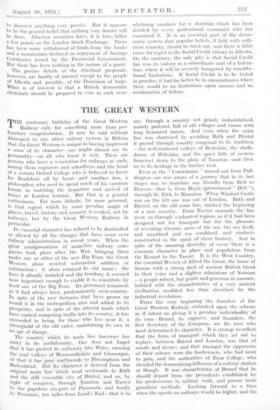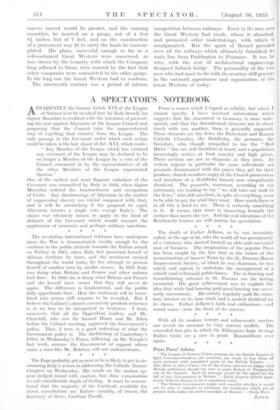THE GREAT WESTERN
THE centenary birthday of the Great Western Railway calls for something more than per- functory congratulation. It may be said without disrespect to any other railway system in Britain that the Great Western is unique in having impressed a sense of its character—one might almost say its Personality—on all who know it well. There are Persons who have- a veneration for railways as such, among them engineers and schoolboys and the head Of a certain Oxford College who, is believed to know his Bradshaw off by heart--and another don, a philosopher, who used to spend much of his vacation leisure in watching the departure and arrival of trains at London termini. But that is a general enthusiasm. Far more definite, far more personal, is that regard which by some peculiar magic of places, travel, history and memory is evoked, not by railways, biit by the Great Western Railway in particular.
Its essential character has refused to be diminished or altered by all the changes that have come over railway adininistration in recent years. When the great amalgamations of mainrline railway, . com- panies took place after ' the War, bringing them under one or other of the new Big Four, the Great Western alone resisted substantial addition or thibtraetion ; it alone retained its old name ; the lines it already included and the territory it covered Were important enough to enable it to constitute by itself one of the Big Four. Its personnel remained, as' it had alWays been, predominantly west-country. In spite of the new factories that have grown up round it in the metropolitan area and added to its prosperity,. and in spite of the arterial roads which have carried competing traffic into its country, it has succeeded in being, for those who live , near it,- a stronghold of the old order, maintaining its own in an age of 'change. The country V* rhich its main line traverses has lthity in its multiforinity. • One does not forget that it has pushed its authority into Wales, crossing the coal valleys of NfonMonthshire and Glamorgan, Or that it has `gone northwards to Birmingham and Birkenhead. But its 'character is derived from the original main line 'which went westwards to Bath and the still venerable city of Bristol, and on, by right of, conquest, through Taunton and Exeter to the populous sea-port of Plymouth, and finally to 'Penzance, ten miles from Land's' End—that is to
say, through a country not grimly industrialised, mainly pastoral, full of old villages and towns with long 'honoured names. And even when the main line was shortened by avoiding Bath and Bristol it passed through country congenial to its tradition —the well-timbered valleys of Berkshire, the chalk- downs of Wiltshire, and the quiet hills of eastern Somerset down to the plain of Taunton—and then on to its heritage in the further west.
Even as the " Cornishman " moved out from Pad- dington one was aware of a journey that in its last stages was to translate one literally from Hell to Heaven—that is, from Hayle (pronounced " Hell "), through St. Erth, to Marazion. When Windsor Castle was on the left one was out of London. Bath and Bristol, on the old main line, marked the 'beginning of a new country. From Exeter onwards the line went on through enchanted regions as if it had been designed not for transport but for the' pleasure of revealing streams, arms of the sea, the, sea itself, and moorland and sea combined, and viaducts constructed in the spirit of sheer fantasy. And in spite of the amazing diversity of scene there' is 'a common character in place and population . from the Kennet to the Tamar. It is the West Country, the essential Wessex of Alfred the Great, the home of Saxons with a strong dash of ancient British blood in their veins and a slighter admixture of Norman —a people robust, but gentle and generous in manner, imbued with the characteristics of a very ancient civilisation modified less than elsewhere by the industrial revolution.
From the very beginning the founders of the Great Western Railway embarked upon the scheme as if intent on giving it a peculiar individuality of its own—Brunel, its engineer, and Saunders, the first Secretary of the Company, are the men who most determined its character. It is strange to reflect that the form of transport which they set out to replace, between Bristol and London, was that of canals and rivers ; and that amongst the opponents of their scheme were the landowners, who had most to gain, and the authorities of Eton College, who dreaded the' demoralising influence of a railway station at Slough. It was characteristic of Brunel that he should depart from the precedents established by his predeceSsOrs in railway work, and pursue more grandiose methods. . Looking forward to a time when the speeds on railways would be higher, and the masses moved would be greater, and the running smoother, he insisted on a gauge, not of ,4 feet 8i inches, but of 7 feet, and on the construction of a permanent way fit to carry the loads he contem- plated. His plans, successful enough so far as a self-contained Great Western were concerned, as was shown by the tenacity with which the Company long adhered to them, were marred by the fact that other companies were committed to the other gauge. In the long run the Great Western had to conform.
The nineteenth century was a period of intense competition between railways. Even in its own area the Great Western had rivals, whom it absorbed, and promoted other undertakings, with which it amalgamated. But the spirit of Brunel presided over all the railways which ultimately furnished its main line from Paddington to Penzance. • It was lie who, with the zeal of architectural engineering, designed Saltash bridge. The personality of the two men who had most to do with its creation still persists in the outward appearance and organisation of the Great Western of today.



































 Previous page
Previous page